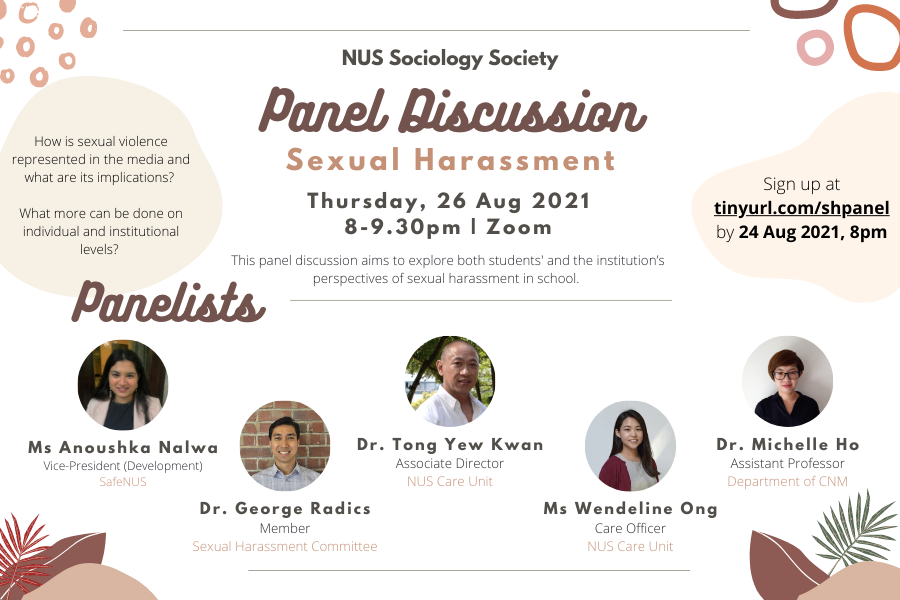Recap: NUS Sociology Society's Panel Discussion on Sexual Harassment
3 Sep 2021 | Events – Panel Discussion

On 26 August 2021, Dr. Tong Yew Kwan (Associate Director) and Ms. Wendeline Ong (Care Officer) from NUS Care Unit (NCU) participated in a panel discussion on sexual harassment organised by the NUS Sociology Society. The panel discussion aimed to explore the perspectives of students and key frontline staff on the role of the media and gender relations in campus sexual misconduct.
The first part of the discussion focused on media discourse. When asked about how media portrayal of sexual harassment cases can affect help-seeking behaviours and recovery in survivors, Ms. Wendeline Ong stated that news reports tend to senstationalise such cases by focusing on graphic details (e.g., stating where the survivor was touched or quoting ad verbatim what the perpetrator had said to the survivor), which may retraumatise survivors
She added that there is also a generalisation of truama; survivors who are not directly linked ot the case can be retraumatised by such news if the profile of the perpetrator or the nature of hte case bears even the slightest resemblance to theirs.
In the second part, the panel discussed about everyday discourse on sexual misconduct. One point of focus was the range of common myths and misconceptions about sexual harassment. Dr. Tong Yew Kwan talked about the role of (social) media in propagating rape myths and highlighted the top two rape myths in everyday discourse:
Myth 1 - "He didn't mean to do it"
Dr. Tong explained that this is often used as an excuse for male aggression, that is that women and other survivors are responsible for the (male) perpetrator’s actions.
This is wrong for two reasons. First, it does not acknowledge that women too can be perpetrators. Second, the motivations are often far more complex, beyond mere ‘uncontrollable’ arousal and includes the desire to exert power and control over others.
Myth 2 - "She lied"
Dr. Tong clarified that contrary to the belief, the rate of false reporting and allegations is in fact “very low”.
This misperception can come from how survivors can be ‘inconsistent’ with their statements – which is an outcome of trauma. Trauma can cause memory gaps or cause one to subconsciously block out certain memories to protect themselves.
Dr. Tong cautioned that this myth can propagate and encourage victim-blaming attitudes, increasing not only hostility but also suspicion toward survivors who come forward. This can also stifle help-seeking behaviours, which can result in under-reporting.
In response to a question on the mandatory reporting policy on campus, both Dr. Tong and Ms. Ong explained that help-seeking and reporting are “not mutually exclusive”. Survivors need not inform the unit about everything that had happened nor fill up forms in order to receive care and support from the unit.
They assured that the unit will “pace with the survivors” and utilise trauma-informed approaches when supporting and caring for survivors
To close the discussion, panelists were asked about what more can be done. Dr. Tong explained that the work should just involve the changing of everyday discourse, but to also translate that change into everyday policies.
Ms. Ong added that the sustained commitment towards addressing campus sexual misconduct “cannot be concentrated at the apex of organisations” and should also be cultivated at the community level. She cited outreach and informational events such as the recent Denim Day as examples of how we can cultivate such commitment in the community.
If you or someone you know is affected by sexual misconduct, please reach out to NCU for support by calling our sexual misconduct helpline (+65 6601 4000) or emailing us at ncu_help@nus.edu.sg.
NUS Care Unit
- University Health Centre,
- 20 Lower Kent Ridge Road,
- #B1-09, Singapore 119080
- For general enquiries:
- +65 6601 3155
- ncu_admin@nus.edu.sg
- Office hours:
Monday - Friday: 9am - 5pm - Website Feedback

